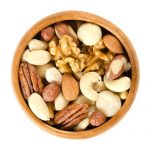 As March is National Colorectal Cancer Awareness Month, our articles are have covered topics such as Colon cancer vs. diverticulitis, the connection between colon cancer and diabetes, colon cancer-fighting foods, and colon cancer prevention foods.
As March is National Colorectal Cancer Awareness Month, our articles are have covered topics such as Colon cancer vs. diverticulitis, the connection between colon cancer and diabetes, colon cancer-fighting foods, and colon cancer prevention foods.
Colorectal cancer is a common cancer that is the second leading cause of cancer deaths, affecting people of all ethnicities. It is a type of colon cancer that starts developing in the colon or the rectum. Our first article focuses on understanding what this cancer is and how it is similar to and different from a condition called diverticulitis, which refers to the infection or injury-related swelling of a part of the colon called diverticula.
Advertisement
The second article discusses how diabetes and high blood pressure can raise the risk of recurrence of this cancer even after it has been eliminated.
The next three articles focus on lifestyle changes that can help in preventing and fighting cancer. These include including more prunes and nuts in the diet, and mind-body therapy.
Colon cancer vs. diverticulitis: Causes, symptoms, risk factors, and complications
Although at first diverticulitis and colon cancer may present similar symptoms, they are two very different conditions. Diverticulitis is a condition set off by infection or rupture of diverticula, which are bulges forming in the lower part of the large intestine or colon. The risk of developing diverticula is usually higher in people over 40. Diverticula themselves do not cause many problems, but once the condition progresses into diverticulitis, it can be quite severe, leading to pain, nausea, and changes to bowels.
Colon cancer has always been linked to old age, with about 75 percent of cases in the over 65 age category. Over the last decade, the number of cases among the younger population has shot up, leading to speculation that modern day diet may have something to do with the problem.
Here we will outline the differences in causes, symptoms, risk factors, and complications with regards to diverticulitis and colon cancer. Continue reading…
 Colon cancer recurrence associated with diabetes, high blood pressure: Study
Colon cancer recurrence associated with diabetes, high blood pressure: Study
Colon cancer recurrence is associated with diabetes and high blood pressure, according to research. In a retrospective study looking at 36,000 colon cancer patients, the researchers found that early diabetes and high blood pressure increased the risk of colon cancer recurrence and mortality, compared to patients without either condition.
Senior study author Nestor Esnaola said, “Although metabolic syndrome has been linked to colon cancer, the third leading cause of cancer death in the U.S., previous work looking at its effect on mortality has not adequately accounted for cancer stage or treatment. Our results suggest that patients with early-stage colon cancer who also have diabetes or hypertension may need to be followed more closely for recurrence and could potentially benefit from broader use of adjuvant chemotherapy.”
“Metabolic syndrome as a whole had no apparent effect on colon cancer recurrence or survival. When we teased out and analyzed the effect of each of its components, however, the data told a different story,” Dr. Esnaola continued. Continue reading…
 Prunes reduce colon cancer risk by benefiting healthy gut bacteria
Prunes reduce colon cancer risk by benefiting healthy gut bacteria
New research suggests that dried plums may reduce the risk of colon cancer by having a positive effect on healthy gut bacteria. Colon cancer is expected to cause close to 50,000 deaths across the United States this year. It is the third leading cause of death in the country.
Researchers at Texas A&M University and the University of North Carolina examined the tissues, as well as the contents, of different segments of animal colons. The results indicated that a diet of dried plums – also known as prunes – increased two major gut bacteria, beneficial microbiota, in the distal colon. This was without affecting the proximal colon. The distal is the left side or last part of the colon that connects to the rectum, while the proximal is the right side of the colon that connects to the small intestine.
The team also discovered that the consumption of dried plums reduced the number of precancerous lesions in rats. The lesions are a strong sign of future cancer development.
While the results do suggest regularly eating prunes is good for colon health and may reduce the risk of colon cancer, human studies are required. Continue reading…
 Nuts help fight colon cancer
Nuts help fight colon cancer
One of the scariest things that can happen to a person is developing cancer. Colon cancer, for example, is the third leading cause of cancer-related deaths in women and the second leading cause in men in the United States. In 2017, colon cancer is estimated to claim over 50,000 lives. However, a multiyear study suggests eating nuts along with an overall healthy diet and regular exercise can help colon cancer patients improve their chances of survival.
Colon cancer often forms after polyp formation in the large intestine. There are small clumps of cells on the lining of the colon that hold the potential to turn into cancer. Anyone can develop these polyps, but being over 50, a smoker, or having a family history of colon cancer give you a higher risk. If you don’t find and remove malignant polyps, they can spread, leading to cancer development. Continue reading…
 Mind-body therapy is beneficial for fighting colon cancer
Mind-body therapy is beneficial for fighting colon cancer
The world is a vast place with many things to do and see. Going on a hike through the dense wilderness, or even just visiting your local park to bird watch can be a very stimulating experience. Everyone enjoys a little adventure now and again, and according to new research, living in a stimulating environment may have a wide range of health benefits in humans, and has even shown fight cancer in mouse studies.
Advertisement
With the pharmaceutical industry being as big as it is, it can be easy to neglect natural methods of keeping healthy. Melinda Angus-Hill of the Huntsman Cancer Institute at the University of Utah wanted to evaluate the benefits of reducing stress through body-mind interventions, as she believes that it can have a positive impact while inducing minimal risk. The study specifically addressed if mind-body interventions would have any effect on wound repair response in colon tumorigenesis in humans.
The mind-body medicine concept focuses on reducing bodily manifestations of stress and anxiety. To achieve this, you would have to be exposed to social and cognitive stimulation as well as participating in physical activity. Continue reading…
The articles build awareness of the risk factors of colorectal cancer and educate us on preventing and treating it. While the exact cause of colon cancer is unknown, scientists have linked it with heredity, a diet of high fat and low fiber, a history of diabetes, and blood pressure to name a few. Research has found that six out of 10 deaths caused by colorectal cancer are preventable. National Colorectal Cancer Awareness Month is a good opportunity to spread awareness about simple things such as regular screening over the age of 50, modifying diet to include colon cancer prevention foods such as prunes and colon cancer-fighting foods such as nuts, and reducing stress through mind-body therapy.
